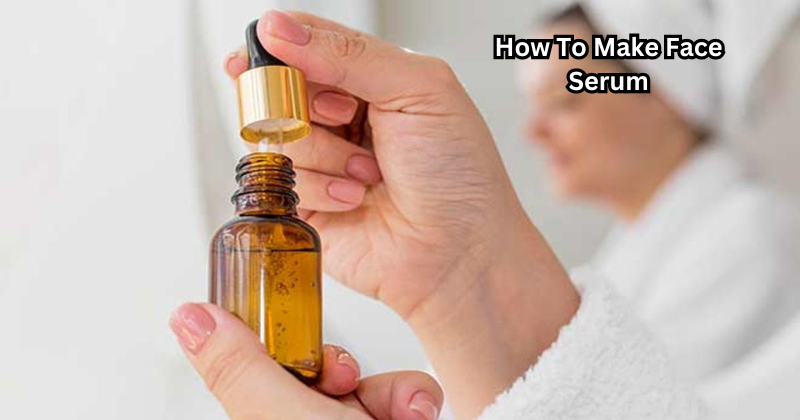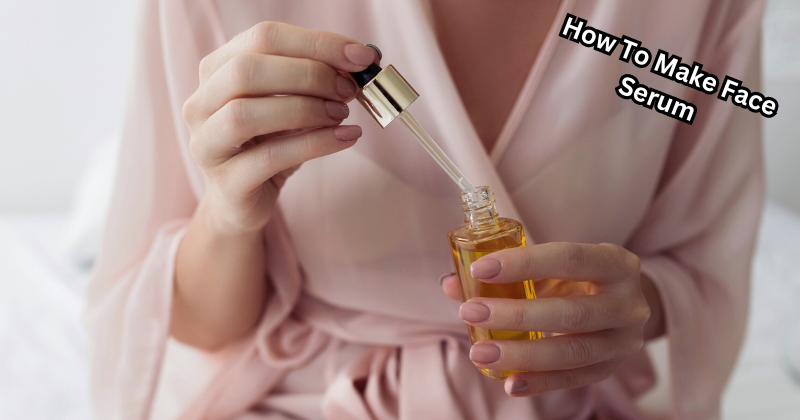Welcome to our guide on how to make your own face serum! Face serums are lightweight, fast-absorbing liquids that can provide a concentrated dose of nourishment and protection to your skin.
By making your own face serum at home, you can tailor the ingredients to your specific skin type and concerns, avoiding harsh chemicals and saving money in the process.
With just a few simple ingredients and some basic equipment, you can create a customized face serum that will leave your skin feeling soft, smooth, and radiant. Let's get started!
What is a Serum?
Before we dive into the steps of making a face serum, it's important to understand what exactly a serum is and why it can be beneficial for your skin.
A serum is a skincare product that contains high concentrations of active ingredients such as vitamins, antioxidants, or hyaluronic acid. These ingredients are typically smaller in molecular size compared to other skincare products, allowing them to penetrate deeper into the skin.
Serums are designed to target specific skin concerns and provide targeted benefits. They are often used after cleansing and toning but before moisturizing in a skincare routine.
What are the Top Ingredients for a Face Serum?
When making your own face serum, it's important to choose ingredients that are suitable for your skin type and address your specific concerns. Here are some popular options to consider:
- Hyaluronic acid: This ingredient helps to hydrate and plump the skin, reducing the appearance of fine lines and wrinkles.
- Vitamin C: Known for its brightening and anti-aging properties, vitamin C can help even out skin tone and improve texture.
- Retinol: Another powerful anti-aging ingredient, retinol can help boost collagen production and reduce the appearance of fine lines and wrinkles.
- Niacinamide: Also known as vitamin B3, this ingredient can help improve skin texture and minimize the appearance of pores.
- Green tea extract: This antioxidant-rich ingredient can help protect against free radical damage and soothe inflammation.
These are just a few examples of beneficial ingredients for a face serum, but there are many more to explore based on your individual skin concerns.
Benefits of Making Your Own Face Serum
Aside from the customization aspect, making your own face serum has other benefits as well.
First, you have complete control over the ingredients that go into your serum, allowing you to avoid harsh chemicals and potentially harmful additives. This is especially important for those with sensitive skin.
Secondly, making your own face serum can save you money in the long run. Many store-bought serums can be expensive, but by purchasing bulk ingredients and creating your own, you can save a significant amount of money.
Finally, making your own face serum allows you to experiment and find the perfect formula for your skin. You can adjust the ratios of ingredients and try different combinations until you find what works best for you.
Step by Step Guide: How To Make Face Serum
Now that we have discussed the benefits of using a face serum and some key ingredients to consider, let's go through the steps of making your own customized serum.
Step 1: Gather Your Ingredients and Equipment
First, you will need to gather all of the necessary ingredients for your face serum. Here are some common ingredients used in homemade face serums and their benefits:
- Carrier oils: These oils make up the base of the serum and provide hydration and nourishment to the skin. Examples include jojoba oil (great for all skin types), rosehip seed oil (anti-aging properties), and argan oil (deeply moisturizing).
- Essential oils: These highly concentrated plant extracts can be added to enhance the benefits of your serum based on your specific skin concerns. Some popular choices include lavender (soothing and calming), tea tree (anti-inflammatory), and frankincense (anti-aging).
- Active ingredients: As mentioned earlier, active ingredients such as hyaluronic acid, vitamin C, and retinol can be added to target specific concerns.
In addition to the ingredients, you will also need some basic equipment including a glass dropper bottle for storing your serum, measuring cups or spoons, and a funnel for easy pouring.
Step 2: Mix Your Ingredients
The next step is to mix all of your chosen ingredients together. This may require some trial and error to find the right combination for your skin concerns. A general rule of thumb is to use a 2:1 ratio of carrier oil to essential oils, and adding small amounts (around 5-10%) of active ingredients depending on their strength.
Use a funnel to pour the mixture into your dropper bottle and shake well to ensure all ingredients are thoroughly mixed.
Step 3: Store Your Serum
It's important to store your homemade face serum in a cool, dark place to prevent oxidation and preserve its potency. Glass bottles are recommended as they do not interact with the ingredients like plastic can.
Step 4: Apply Your Serum
To use your face serum, start by cleansing and toning your skin. Then, using the dropper, apply a few drops of serum onto your fingertips and gently massage onto your face and neck in a circular motion.
Allow the serum to absorb into the skin for a few minutes before applying moisturizer on top.
Tips and Tricks for Making Your Own Face Serum
Now that you know how to make your own face serum, here are some additional tips and tricks to keep in mind:
- Always do a patch test before applying the serum all over your face to ensure there are no adverse reactions.
- When purchasing ingredients, opt for high-quality, organic options whenever possible.
- Customize your serum based on the season or changes in your skin. For example, add more hydrating oils during winter months or switch out active ingredients depending on any changes in skin concerns.
- Don't be afraid to experiment with different ingredient combinations until you find what works best for your skin.
Test out different ratios and ingredients to see what gives you the desired results.
What Ingredients to Avoid in a Face Serum
When making your own face serum, it's important to avoid certain ingredients that can be potentially harmful for your skin. These include:
- Fragrances and dyes: These additives can cause irritation and sensitivities, especially for those with sensitive skin.
- Mineral oils: While commonly used in skincare products, mineral oils can clog pores and cause breakouts.
- Parabens: These preservatives have been linked to hormonal disruption and potential health risks. Look for paraben-free options when choosing ingredients.
These are just a few examples, but it's important to do your research and avoid any ingredients that may not be suitable for your skin.
FAQs
Can I make my own vitamin C serum?
Yes, you can easily make your own vitamin C serum by combining vitamin C powder with a carrier oil and an emulsifier. However, it is important to store this serum in a dark bottle and use it within a week as vitamin C can oxidize quickly.
Can I use my face serum every day?
It depends on the ingredients in your serum and your skin type. Some active ingredients may be too strong for daily use, so it's important to read the instructions and do a patch test before applying all over your face.
What to mix with aloe vera for face?
Aloe vera can be mixed with various ingredients to create a face serum, depending on your skin concerns. Some options include using aloe vera as the carrier oil and mixing in essential oils or active ingredients like hyaluronic acid. It can also be mixed with other carrier oils for added benefits.
Can I use honey and aloe vera on my face daily?
Yes, honey and aloe vera can be used on your face daily as they both have nourishing and soothing properties. However, it's always best to do a patch test first and observe how your skin reacts before incorporating them into your daily skincare routine.
Conclusion
In conclusion, creating your own face serum empowers you to take control of your skincare journey. By blending carefully chosen ingredients tailored to your skin's specific needs, you can craft a potent and personalized elixir that promotes healthy, glowing skin. The process of formulating a face serum allows for experimentation, creativity, and a deeper understanding of skincare ingredients.
Embracing the natural benefits of oils, extracts, and essential oils in your homemade serum can lead to nourished, rejuvenated skin. So, embark on this journey of self-care, exploration, and customization, and revel in the beauty of a skincare routine crafted just for you.


